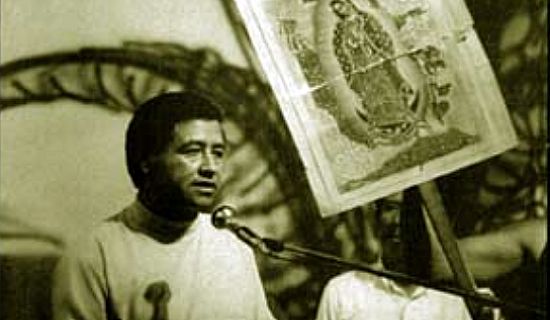Cesar Chavez: Listening To The Least Qualified Amongst

Our friend, Juanita Brown, relays this remarkable first-hand episode ...
The year is 1966. The grape fields of California are ablaze with conflict and tension. Cesar Chavez and his fledgling United Farm Workers are seeking negotiations through collective bargaining elections with the DiGiorgio Corporation—the largest grower of table grapes in the nation. Many new workers are frightened, already indentured by the company who paid their way from Mexico and now living in DiGiorgio’s labor camps. They support their brothers and sisters in the United Farm Workers who are seeking a better life but they have children to feed and have no passage home.
The farm labor camps, row on row of cinder block housing, are located on company property. There are watchtowers overlooking the camps, silent reminders of earlier days when the Japanese were interred in these same buildings during World War II. There are no longer guards in the towers but there are guards at the gates. Because the camps are on private property, United Farm Worker organizers have been barred from entry—barred from engaging in conversations with the workers inside—barred from discussing the workers’ democratic rights under the law to vote for the United Farm Workers to represent them in conversations with the growers. A paradox—workers have the right to vote in the first election in agricultural history but not the means to share in the conversation needed to make an informed choice on behalf of a better life for themselves and their families.
What to do? Cesar Chavez and farm worker organizers are on the roadside at 5 AM as the trucks leave for the fields, passing small informational leaflets through the slats of the trucks. The growers have permitted informational leafleting.
Even Cesar is beginning to lose hope. He calls a meeting of the whole community. Men, women, children...the farm worker meeting hall is full. The mood is somber. Cesar explains the situation to those gathered, realistically, honestly, without artifice.
Cesar says he has no answer to the dilemma. If there is no way to engage in conversation with the workers in the camps, it will be hard to change our future, he says. He asks for their honest assessment, for ideas, for help. All bearing witness know that some unforeseen breakthrough is the only way through.
People share ideas, many ideas. None are rejected. Everyone is asked not to debate because no decision is going to be made tonight. We are trying to listen, he says, listen to every voice that wants to be heard. Many voices enter the conversation. The meeting is nearly done. Way in the back of the hall sits an old woman wrapped in a rebozo, a Mexican shawl. She stands and speaks quietly in Spanish.
“Well, I know I am not qualified, but there was something ... I had an idea, maybe just a small idea, but maybe it can help. If we can’t go in to visit the workers, maybe there is a way they could come to us. I believe only God can help us now. Why don’t we build an altar, a small church on the public roadway across the street from the camps. We can hold Mass and a prayer vigil every night. I know there are priests who will help us. The workers can come across the street to the Mass and the prayer vigil. The growers can’t
stop them from coming to a prayer vigil, can they? And they can’t stop us from holding one, can they? And as we pray together with the workers from the camps, they will come to know who we are and what we stand for and then they can vote in a better way for their future.”
And so it was. Cesar’s old station wagon got parked across the road. An altar was erected on the back of the wagon and the workers came, first a few, and then many. The DiGiorgio election was held and the United Farm Workers gained the right to have a voice in creating their future as part of a democratic society, all because of the voice of the “least among us.”
As the person who translated the old woman’s words from Spanish, I think somehow the energy of her presence, the power of her simplicity, and the collective sigh of “Yes” that emerged from the collective in the room will remain forever etched in my own being.
Posted by Nipun Mehta on Sep 11, 2009



On Sep 13, 2009 Pancho wrote:
YES we did!
YES we can!
YES we will!
“Once social change begins, it cannot be reversed. You cannot uneducated the person who has learned to read. You cannot humiliate the person who feels pride. You cannot oppress the person who is not afraid anymore.” --César Chávez
Post Your Reply